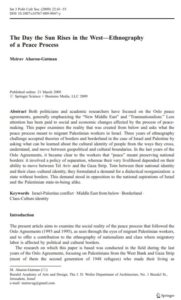The day the sun rises in the west — ethnography of a peace process
(2009 | International Journal of Politics, Culture, and Society 22(1): 41-55)
 Authors: Meirav Aharon-Gutman
Authors: Meirav Aharon-Gutman
Abstract: Both politicians and academic researchers have focused on the Oslo peace agreements, generally emphasizing the “New Middle East” and “Transnationalism.” Less attention has been paid to social and economic changes affected by the process of peacemaking. This paper examines the reality that was created from below and asks what the peace process meant to migrant Palestinian workers in Israel. Three years of ethnography challenge accepted theories of borders and borderland in the case of Israel and Palestine by asking what can be learned about the cultural identity of people from the ways they cross, understand, and move between geopolitical and cultural boundaries. In the last years of the Oslo Agreements, it became clear to the workers that “peace” meant preserving national borders: it involved a policy of separation, whereas their very livelihood depended on their ability to move between Tel Aviv and the Gaza Strip. Torn between their national identity and their class–cultural identity, they formulated a demand for a dialectical reorganization: a state without borders. This demand stood in opposition to the national aspirations of Israel and the Palestinian state-in-being alike.